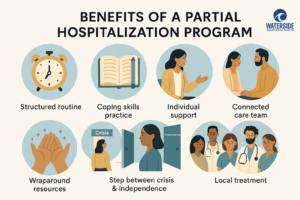Even if you’ve stepped away from treatment before, you’re not “too far gone” to come back. If anything, your willingness to even read this is a sign that part of you still wants relief.
PHP isn’t a circle of strangers swapping stories—it’s a structured, skills-based, and deeply supported level of care designed to help you get back on track without starting over from scratch. At Waterside Behavioral Health’s Partial Hospitalization Program in Massachusetts, you’ll find more than a chair in a group room. You’ll find a daily rhythm, practical coping tools, and a team that doesn’t hold your absence against you.
1. Structure That Restores Your Daily Rhythm
When you’re living with anxiety or depression, time can start to blur. Mornings slip into afternoons without you realizing it, and routines you once had seem impossible to get back.
PHP interrupts that cycle.
Instead of waking up wondering what the point is, you have a set schedule to follow.
- Mornings may start with grounding exercises, helping you steady your breath and focus before the day even begins.
- Mid-morning can include skills groups that blend education with practice—like how to challenge intrusive thoughts or regulate emotions when your body is in fight-or-flight mode.
- Afternoons often include one-on-one therapy or psychiatric check-ins.
It’s not about controlling your day—it’s about giving your mind and body the stability they’ve been missing.
2. Skills You Can Actually Use Outside the Building
PHP isn’t meant to keep you dependent on the program. It’s meant to make you more confident in your own ability to cope.
You’ll practice:
- Cognitive Behavioral Therapy (CBT) techniques to reframe negative thinking.
- Mindfulness and grounding strategies you can use at the grocery store, in traffic, or at work.
- Problem-solving skills for when life throws something unexpected your way.
We treat the program like a rehearsal space for your mental health. You try it here first, mess up in a safe place, then adjust until it feels natural enough to use in your everyday life.
3. Individual Support That Goes Beyond Groups
Yes, group therapy is part of PHP—but it’s not the whole story. You’ll also meet individually with clinicians who keep track of your personal goals, triggers, and progress.
This matters for two reasons:
- Your voice doesn’t get lost in the crowd.
- You have a private space to address the things you’re not ready to share in group.
One client described it like this:
“I could talk about my panic attacks in group, but it was in my one-on-one where we figured out why they kept happening.”
4. Wraparound Resources for the Parts of Life That Feel Messy
Anxiety and depression rarely show up in isolation. They can tangle up your relationships, finances, sleep, and self-esteem.
That’s why PHP at Waterside includes:
- Case management to help with insurance, housing resources, and referrals.
- Psychiatric care for accurate diagnosis and medication management.
- Family education so the people in your life understand how to support you without burning out themselves.
If you live nearby, our Partial Hospitalization Program in Plymouth County, MA can also connect you with local community resources—things like peer support groups, nutrition counseling, or vocational programs you might not have known were available.
5. A Team That Doesn’t Hold Your Absence Against You
If you left before, you’re not walking back into judgment.
We know life gets complicated. Sometimes you ghost because you’re embarrassed, tired, or unsure if you can handle the work.
When you return, our focus isn’t on why you left—it’s on what you need now.
One client told us, “I was nervous they’d ask why I left. Instead, they just said, ‘We’re glad you’re here.’”
That’s the spirit of PHP—you’re allowed to return without having to defend yourself.
6. A Step Between Crisis and Independence
Not everyone needs inpatient care, but weekly therapy alone may not be enough. PHP is the middle ground.
- More intensive than outpatient therapy: You attend several hours a day, multiple days a week.
- Less restrictive than inpatient care: You go home each evening, practicing the skills you learned that day in your real life.
This bridge between crisis stabilization and independent living can help you heal without feeling cut off from the world.
7. Local Care That Understands Local Life
Being treated in your own region means your care is connected to your reality. In Plymouth County, that might mean understanding the strain of seasonal employment, long commutes, or close-knit neighborhoods where privacy matters.
If you’re in a nearby area, we also serve Bristol County, MA—making it possible to get the same level of care without traveling far.
FAQ: Partial Hospitalization Program for Anxiety and Depression
1. Is PHP only group therapy?
No. While group therapy is an important part of PHP, it also includes individual counseling, psychiatric care, and case management.
2. How is PHP different from IOP (Intensive Outpatient Program)?
PHP typically involves more hours per week and offers a higher level of clinical support. It’s often the right choice if your symptoms are more severe or impacting multiple areas of life.
3. Can I come back to PHP if I left before?
Yes. Our program is built on the belief that recovery isn’t always linear. You won’t be judged for stepping away—you’ll be welcomed back.
4. Do I need a referral to start PHP?
Not always. Many clients self-refer, but we can also accept referrals from your therapist, primary care provider, or psychiatrist.
5. What if I can’t attend every day?
We’ll work with you to create a schedule that meets your clinical needs while accommodating unavoidable life circumstances.
Ready to Take the Next Step?
If you’ve been living with anxiety or depression—and especially if you’ve left treatment before—PHP can help you rebuild without starting over.
Call 774-619-7750 or visit our Partial Hospitalization Program page to learn more about our services in Plymouth County, MA.





